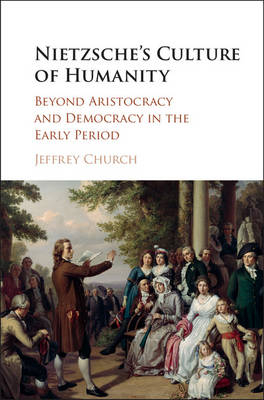
Nietzsche's Culture of Humanity
Cambridge University Press (Verlag)
978-1-107-12026-6 (ISBN)
Nietzsche scholars have long been divided over whether Nietzsche is an aristocratic or a democratic thinker. Nietzche's Culture of Humanity overcomes this debate by proving both sides wrong. Jeffrey Church argues that in his early period writings, Nietzsche envisioned a cultural meritocracy that drew on the classical German tradition of Kant and Herder. The young Nietzsche's 'culture of humanity' synthesized the high and low, the genius and the people, the nation and humanity. Nietzsche's early ideal of culture can shed light on his mature period thought, since, Church argues, Nietzsche does not abandon this fundamental commitment to a cultural meritocracy. Nietzche's Culture of Humanity argues that Nietzsche's novel defense of culture can overcome some persisting problems in contemporary liberal theories of culture. As such, this book should interest Nietzsche scholars, political theorists and philosophers interested in modern thought, as well as contemporary thinkers concerned with the politics of culture.
Jeffrey Church is a political theorist whose research area is the history of modern political thought, with particular interest in continental thought, from Jean-Jacques Rousseau through Friedrich Nietzsche. His work examines the reflections of past philosophers on freedom, individuality, education and culture, and shows how these reflections can inform contemporary liberal and democratic theory. He is the author most recently of Infinite Autonomy: The Divided Individual in the Political Thought of G. W. F. Hegel and Friedrich Nietzsche, which won the Best First Book award given by the Foundations of Political Theory section of the American Political Science Association.
Part I. The Foundation of Culture in the Early Nietzsche: 1. The influence of Kant and Herder; 2. Nihilism and the contradiction of human nature; 3. Freedom and the best life; Part II. Two Concepts of Culture in the Early Nietzsche: 4. Nietzsche's exemplary individual; 5. National culture; 6. Cosmopolitan culture; Part III. The Means to Culture in the Early Nietzsche: 7. The education to culture; 8. The state, liberalism, and culture; Part IV. The Significance of the Early Nietzsche: 9. From the early to the late Nietzsche; 10. Culture as identity, culture as individuals.
| Verlagsort | Cambridge |
|---|---|
| Sprache | englisch |
| Maße | 158 x 235 mm |
| Gewicht | 600 g |
| Themenwelt | Geisteswissenschaften ► Philosophie ► Geschichte der Philosophie |
| Geisteswissenschaften ► Philosophie ► Philosophie der Neuzeit | |
| Sozialwissenschaften ► Politik / Verwaltung ► Politische Theorie | |
| ISBN-10 | 1-107-12026-8 / 1107120268 |
| ISBN-13 | 978-1-107-12026-6 / 9781107120266 |
| Zustand | Neuware |
| Haben Sie eine Frage zum Produkt? |
aus dem Bereich


